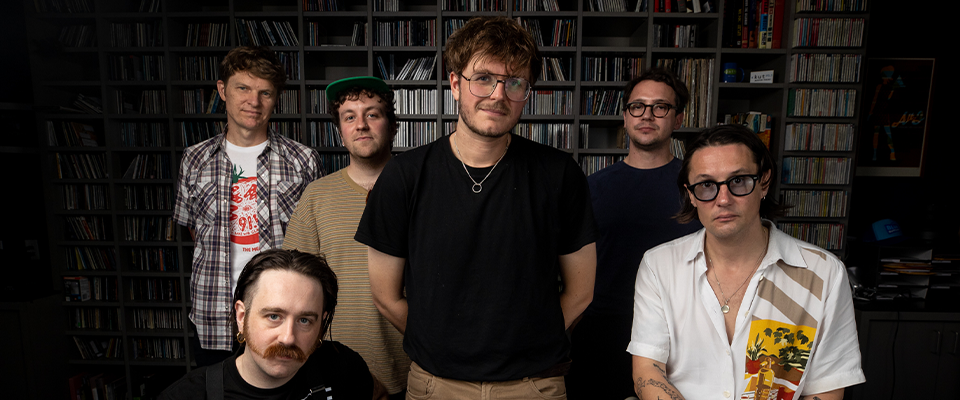Vocalist James Smith reevaluates everything on the band’s upcoming release, “Where’s My Uptopia?”
By Jeff McCord
“Are we born for nothing if we die alone?”
Post-punk bands aren’t known for doing this kind of soul-searching, but there it is, the opening line to “The Undertow”, a track off of Yard Act’s decidedly different follow-up, Where’s My Utopia? (out in March of 2024).
Yard Act released their malcontented debut, The Overload, early last year, and it launched the band on a roller coaster ride that has yet to pull back into the station. The album topped the charts at #2, BBC’s Steve Lamacq called it the album of the year, it was nominated for the Mercury Prize, NME called them the best new act, and they left a triumphant week at SXSW with the coveted Grulke Prize. And, oh yeah, Elton John rang them up to see if they could record together.
After years of toiling in obscurity, singer James Smith, bassist Ryan Needham and the Leeds group they assembled rocketed to success. It was everything they always wanted.
Or so they thought.
“I’m grateful in ways/
I could never explain,/
in a moment I can never escape,/
but I can’t phone it in.”
Another track from Utopia, “Petroleum”, addresses a night among the endless gigs when Smith, a new father with a 2 ½ year-old son, just didn’t want to be there. He’s achieved so much But he’s still looking for more.
“I think I am.”
James Smith is talking with me after their Studio 1A session on a recent late-year stop in Austin. Yard Act, expanded to a six-piece unit for this session, played songs like “Petroleum” with great enthusiasm. But there’s no escaping their message.
“It does actually ask the existential questions,” Smith concedes. “And I think they’ve always been there. The last two years in the build-up to getting this success was a distraction from that. That made me lose sight of trying to dig a bit deeper.”
“I think the subject matter of the first album feels a lot less important, apart from “Hundred Percent Endurance”, which is the last track on the album. I think the character studies and the political stuff feels minute in comparison to what we’re trying to explore now. I just feel less and less sure of myself by the day. And that’s actually quite comforting.”

Smith says Yard Act became a post-punk group out of ‘affordability’.
“We knew we could get a 3-piece rock band with a vocalist on top sounding good. We’ve done it before. It came back into fashion. We were doing that ten years ago before, but we didn’t get any kudos for it. We could fit instruments in the back of a car. Obviously, that’s all changed now as you’ve seen today. It was a pragmatic experiment that started early on. And it also meant that we could record ourselves quite easily and get good sound. But then we outgrew it.”
On subject matter, that may be true, but Smith’s monotonic speaking-singing style still brings to mind a post-punk ethos.
“Well, I don’t know what post-punk means anymore. If people want to call it post-punk, I don’t mind. But I think everyone has a different idea of what it is.”
But there’s no mistaking the change, from the title of their upcoming album –Where’s My Utopia? – to their first single, “Dream Job”, which seems to simultaneously skewer the music business and lampoon the absurdity of rock stars complaining.
Even more on point is the eight-minute standalone single, “The Trench Coat Museum” the band released earlier this year, which closes the book on a certain way of thinking.
“For me,” Smith explains, “it was quite an important song because it was the first step towards deconstructing the character I’ve been playing in Yard Act, the trenchcoat-wearing loudmouth. When we kind of got that success, I realized that [the character] was occupying quite a lot of space and it was quite one-dimensional in a lot of ways. If I wanted to retain a sense of myself and have a little more longevity, we had to take steps towards deconstructing what we sounded like – and how I acted and what I spoke about. It did it by looking at the history of the trench coat and how it’s been used over the years and what it’s been used for as a metaphor; a jumping-off point for what essentially is the fact that everything does change and nothing is set in stone. I’ve become incredibly aware of my own ego and I don’t know where I’m at with it yet, but I know that I’m feeling more and more like I want to shrink and disappear. I’m trying to dissolve myself essentially, but at the same time, I’m trying to find the separation between the stage performance where I can fully embrace that it’s all about me and then and then immediately shut [that] off as soon as I leave the stage. I think that feeds into the existential questions that I’m trying to answer, not trying to ask and I don’t expect to get answers to. Every day I see myself as less and less important. But then it’s like those spikes of what for – I’m important to my son. And I don’t know. People come up, say that the songs have been important to them. And that’s strange because it’s really moving to hear people come after a show and say that it’s affected them. But in the same breath, I don’t take any responsibility for that. And it’s not pride as such. It’s not my duty to make people feel a certain way. It’s just a connection, nice connections, everything.”
“. . .it was quite an important song because it was the first step towards deconstructing the character I’ve been playing in Yard Act, the trenchcoat-wearing loudmouth.”
–James Smith discussing “Trenchcoat Museum.”
Smith pauses, as if coming up for air. He smiles.
“We’re not going to get answers here.”
Smith is examining his and his bandmates’ situations more acutely than a lot of his peers. He’s been through a lot in a relatively short amount of time. Success, a new family. I bring up “The Undertow”, which addresses a job that keeps him away from his new son.
“This strip’s been hard. This is the longest we’ve done. We’ve always had a rule of no more than two weeks. This is closer to three weeks. It’s complex because it is really hard. But I’m also enjoying myself. “The Undertow” addresses that guilt. I look to my wife for support, and she is like, ‘You are allowed to enjoy this’. So is it is complex in that sense.“
“I think we’re getting to a point now where we’ve come out on the other side and we’re reevaluating what’s more important to us. Everyone’s getting better on the road. Everyone’s slowed down on the drinking. I’ve stopped drinking. We’re out running every day. We eat better. I mean, the party is exciting. When we first came to Austin for South by Southwest, those were our first American shows. It was an incredible four days. We did ten shows in four days and I loved every minute of it. But the only way to get through it was drinking and I paid for those four days. Not the best time. You can’t do that for two years now. So now I get to come back to Austin and I get to sort of soak it up in a different way like this. There are always two energies, the nightlife and the culture that exists within, just the way people live their day-to-day lives. And I’m getting a lot more touring now and seeing places I’ve never been before on that wavelength. That’s good.”
New attitudes. New outlooks. New songs. If “Petroleum” addresses a low point for Smith and his chosen profession, he’s found a way to look beyond it.
“I can’t phone in for a long time. But if you’re not feeling it, you’ve got to find the way to… I’ve since reevaluated what live performances is. There’s a sacred nature to it. If you decide to do this for a job, it’s your responsibility not to squander. You have to tap into this energy in the room and let the crowd lift you out. It’s your absolute duty to try and get to that elevated point. That’s what a live performance is, it’s a shared experience.”
FOLLOW YARD ACT
Set List:
*“Petroleum”
*“Dream Job”
“Payday”
Album: *Where’s My Utopia? (Republic Records, March 1, 2024)
Musicians:
James Smith – vocals; Ryan Needham – bass, bgv; Sam Shipstone – guitar, bgv; Jay Russell – drums, bgv; Chris Duffin – keys, sax; Doug Marvin – congas
Credits:
Producer: Deidre Gott; Audio Engineer: Rene Chavez, Joe Valadez; Audio Mix: Rene Chavez; Cameras: Renee Dominguez, Nastassja Collak, Michael Minasi; Edit: Renee Dominguez; Host: Laurie Gallardo

